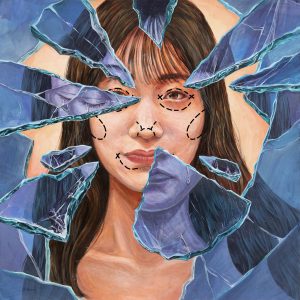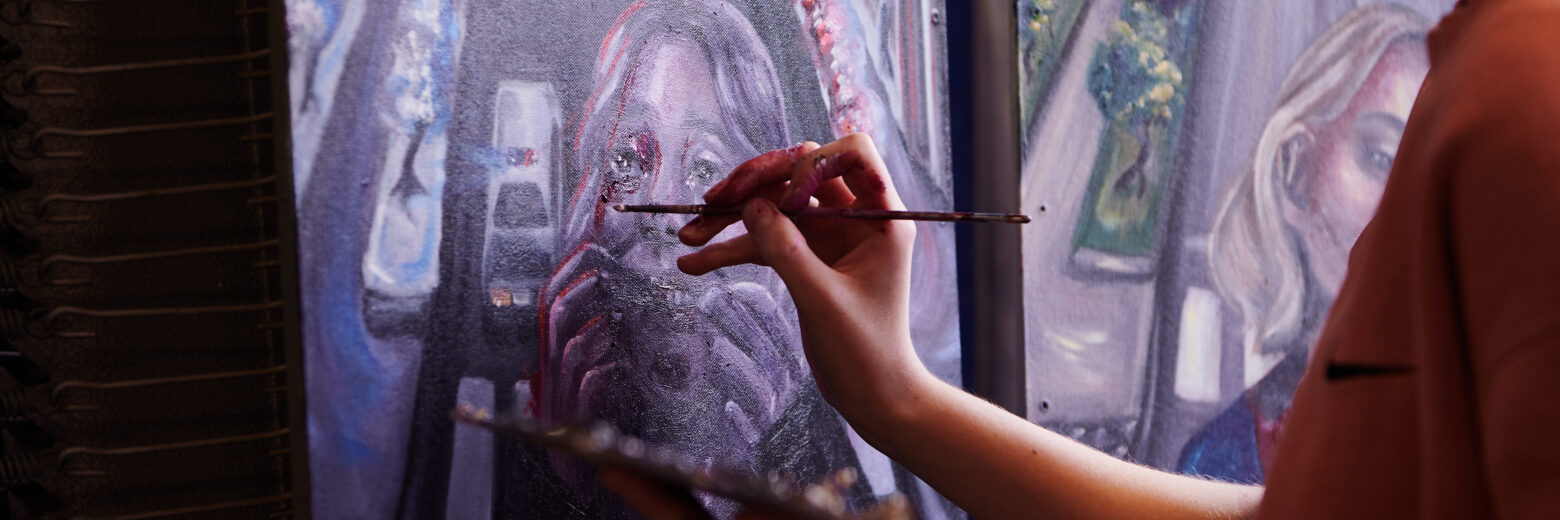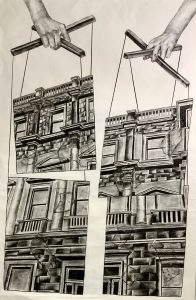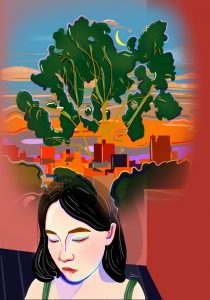ART AND DESIGN
The multi-faceted nature of Art allows individuals to explore an endless array of processes such as drawing, painting, printmaking, photographic imagery, 3D construction and mixed media.
WHAT IS ART AND DESIGN?
The multi-faceted nature of Art allows individuals to explore an endless array of processes such as drawing, painting, printmaking, photographic imagery, 3D construction and mixed media. It is a fascinating and rewarding subject that allows you to use your imagination and creativity, whilst acquiring a range of skills, abilities and directions in art as you engage with the world in a visual and tactile way.
This short video gives you an insight into art in action at DLD College London.
To find out more about our outstanding Art Department, view our dedicated web page here.
WHAT IS ART AND DESIGN AT DLD?
Artistic skill underpins every creative practice. Our approach is to support the development of practical skills whilst encouraging expression and personal creativity. During the first part of the academic year you will explore a variety of materials, processes and techniques, whilst simultaneously building on your contextual knowledge. These new skills will act as a foundation for the second part of the academic year, which consists of an exam unit, where you will draw upon previous learning experiences to devise your own project. Throughout this creative journey you will be guided by experienced and supportive staff members who will draw on a variety of teaching methods in order to help you achieve your potential.

HOW IS ART AND DESIGN AT DLD ASSESSED?
First year A level | Weighting | Format |
| Component 1 | 60% | Portfolio |
| Component 2 | 40% | Externally set project (10 Hour Exam) |
Progress on to:
Second year A level | Weighting | Format |
| Component 1 | 60% | Personal Investigation |
| Component 2 | 40% | Externally set project (15 Hour Exam) |
Exam Board: AQA
WHAT DO I NEED BEFORE ART AND DESIGN AT DLD?
It is essential to have studied Art at GCSE level in order to start studying Art at AS Level. It is also important to have a genuine interest in the subject, and a willingness to learn and develop your skills and ideas. On a more practical level, a digital camera (preferably around 10 megapixels) and a USB is strongly recommended, An A1 black vinyl portfolio, and a range of drawing, painting and craft materials would also assist your independent / homework studies in this subject.
GOOD SUBJECT COMBINATIONS
Subjects that can complement the study of Art could include Photography, Grpahics and Media Studies. This is because they also involve analysing and responding to visual culture, society and contemporary ideas and issues.
Due to the diverse nature of Art, it complements many subjects offered at DLD because it often contains elements of them. For example, English Literature, Sociology, Physics, Mathematics and History are endless resources that artists the world over have drawn upon to inspire their work.
WHAT DO I DO AFTER DLD?
A high percentage of our students progress on to Art Foundation and Degree courses at Art Colleges, after DLD, in London, across the UK and internationally. DLD is very proud of its 100% record in placing students onto Art Courses on completion of their A Level Studies. This route into graduate study enables students to develop their studies further in various disciplines such as Art & Design, Photography, Textiles, Fashion, Design, New Media and Architecture.
The creative Arts industries make a significant and culturally highly important social contribution to the fabric of our country and the UK economy – accounting for 7.9% of GDP, a figure that is growing significantly faster than the economy as a whole. Career paths in art and design can include becoming a Professional Artist, a Graphic, Web, Textiles or Fashion Designer, a Photographer or Architect. There is also the possibility of becoming an Illustrator, an exhibition curator, or working in gallery education. With good training, qualifications and professional skills in Art & Design the list of possible career routes is endless!
The Arts provision at DLD is a thriving department that will build and develop your skills and creativity, as well as prepare you for further study, and an exciting career in the Arts.
This year DLD Art Students have won various regional and national awards. This includes first, second and highly commended awards in the annual ISA Art Competition
QUESTIONS ON ART AND DESIGN COURSES
Q: Can I do the course in one year?
A: No.
Q: Will I have to work outside of lesson time?
A: Yes. You should expect to spend at least 4 – 6 hours on independent work per week at home or in the art rooms.
ENTRY REQUIREMENTS ON ART AND DESIGN FOR INTERNATIONAL STUDENTS
To study A Levels, your current or pending exam results should be equivalent to or higher than GCSE (General Certificate of Secondary Education) in at least 5 subjects and a minimum level of English equivalent to IELTS 5.5.
At the start of each academic year of study, students following an A Level course without a pass at Level 5/Grade C in GCSE or IGCSE English Language or with an Academic English score below 6.5 overall must join an Academic English training course for the duration of the academic year which will be timetabled alongside A Level lessons.
If your level of English is not sufficient to meet the entry criteria for the A Level programme you will normally be offered a place on the one year Advance Preparation Course (Pre A-Level) in order to bring your English skills up to the required level.





